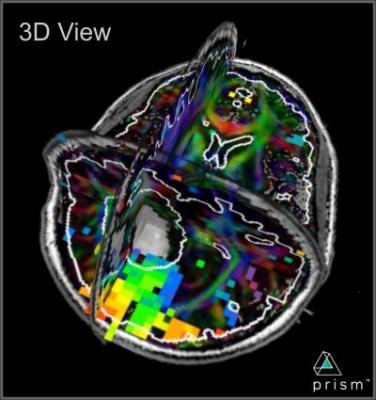
This is a 3D view of the brain and tumor taken from the direction of surgical approach. Image by Prism.
November 23, 2009 - The National Institutes of Health (NIH) gave a three-year grant for $1.6 million to The Medical College of Wisconsin in Milwaukee and Prism Clinical Imaging Inc. (Prism) to develop and clinically validate advanced medical imaging software.
The solution is designed to aid the diagnosis and treatment of patients with brain cancer by using mapping brain function with MRI. The grant aims to help expand patient access to cutting edge technology.
“This project will allow us to refine and validate new methods for mapping brain function with MRI and for displaying the results in an intuitive format that greatly simplifies interpretation by the physician," said Edgar DeYoe, Ph.D., principal investigator, professor of radiology at the Medical College.
The software that Medical College of Wisconsin and Prism have jointly developed gives physicians anatomical, functional and physiological image sequences in a single integrated view referred to as a stack, similar to playing cards in a deck. They also created a new display, a functional field map, that shows what the brain images mean for the patient's vision and movement abilities. This allows surgeons to identify and avoid areas of the brain that may be essential for movement, vision, and other functions, thereby permitting removal of as much of a tumor as possible without impairing a patient’s brain function.
This multi-institutional grant includes researchers at Cleveland Clinic and Radiology Associates of Sacramento. At present, the new software is used primarily by research and academic institutions such as Froedtert Hospital, a major teaching affiliate of the Medical College of Wisconsin. Together the three sites hope to recruit 50 patients per year to the study.
The researcher hope the functional field map will serve as a powerful tool to aid diagnosis, treatment planning, and follow-up assessment for virtually any brain pathology, especially cancer. The NIH grant will fund advanced development of this imaging technology in a program designed to promote commercial application of promising healthcare technologies. Prism is participating in the program in the effort to further develop its imaging technology and move it from research institutions like Froedtert and the Medical College into hospitals and clinics worldwide. Moving the technology into wider application at mainstream hospitals and clinics across the country will give a greater number of patients access to a technology that could significantly improve the outcomes of their cancer treatment.
For more information: www.mcw.edu/display/router.aspx


 July 25, 2024
July 25, 2024 








